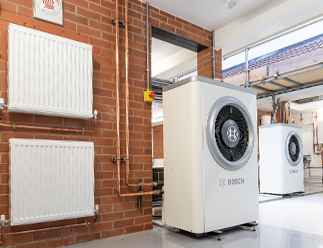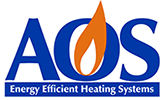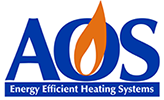AOS Blog

Heat Pumps and Air Quality: How They Improve Indoor Environments
When it comes to heating your home, there’s more to consider than just energy efficiency and cost savings. One often overlooked factor is indoor air quality (IAQ), which plays a crucial role in your overall health and comfort. Poor indoor air quality can lead to a range of health issues, from minor allergies to more serious respiratory conditions. Fortunately, heat pumps can help improve the air you breathe while offering a more sustainable and cost-effective way to heat your home.
In this blog post, we will explore how heat pumps contribute to better indoor air quality and why they are a smart choice for homeowners who care about the air inside their homes.
The Link Between Heating Systems and Air Quality
Traditional heating systems, such as gas or oil boilers, can negatively impact indoor air quality. These systems burn fossil fuels to generate heat, releasing by-products such as carbon monoxide, nitrogen dioxide, and particulate matter into the air. If your home is not properly ventilated, these pollutants can build up indoors, leading to poor air quality.
Moreover, old-fashioned heating systems often circulate dust, allergens, and other contaminants through your home, which can exacerbate allergies, asthma, and other respiratory problems. In contrast, heat pumps do not burn fuel to generate heat, eliminating the risk of combustion-related pollutants and helping to maintain a cleaner, healthier indoor environment.
How Heat Pumps Improve Indoor Air Quality
1. No Combustion, No Harmful Emissions
One of the primary reasons heat pumps improve air quality is that they do not rely on combustion. Unlike gas or oil boilers, heat pumps work by transferring heat from the outside air, ground, or water into your home. This process does not produce harmful emissions such as carbon monoxide or nitrogen dioxide, both of which can lower the quality of the air you breathe indoors.
The absence of combustion in heat pump systems also eliminates the risk of gas leaks or carbon monoxide poisoning, ensuring a safer home environment for you and your family.
2. Better Air Circulation
Heat pumps not only heat your home efficiently, but they also help to improve air circulation. In particular, air-source heat pumps can filter and circulate the air in your home, reducing the presence of indoor pollutants. These systems draw in outdoor air, filter it, and then distribute it evenly throughout your living spaces, creating a steady flow of fresh, clean air.
This improved air circulation reduces the concentration of airborne particles such as dust, pet dander, and allergens, which can contribute to respiratory issues. A steady supply of fresh air can make a significant difference, especially for households with children, the elderly, or individuals who suffer from allergies or asthma.
3. Humidity Control
Another key factor in indoor air quality is humidity. High humidity levels can lead to the growth of mould, mildew, and dust mites, which thrive in damp conditions and can contribute to respiratory problems. On the other hand, air that is too dry can irritate the respiratory tract and cause discomfort.
Heat pumps help to maintain balanced humidity levels in your home. Air-source heat pumps, for example, dehumidify the air as they operate, reducing the moisture content and lowering the risk of mould and mildew growth.
By keeping humidity levels in check, heat pumps can create a more comfortable and healthy indoor environment.
4. Filtration Systems
Many modern heat pumps come equipped with advanced air filtration systems, which can significantly improve the quality of air circulating through your home. These filters can trap airborne particles such as dust, pollen, bacteria, and viruses, keeping the air cleaner and reducing the risk of respiratory illnesses.
Some heat pump models feature high-efficiency particulate air (HEPA) filters or ultraviolet (UV) light systems, which are particularly effective at removing harmful contaminants from the air. HEPA filters are designed to capture up to 99.97% of airborne particles, while UV systems can neutralise bacteria and viruses, providing an extra layer of protection against pollutants.
With these filtration options, heat pumps offer more than just temperature control—they actively contribute to a healthier indoor environment.
5. Less Dry Heat
Traditional heating systems, such as radiators or electric space heaters, can dry out the air in your home. This dry heat can cause discomfort, such as dry skin and irritated respiratory passages. In contrast, heat pumps deliver a gentler, more consistent heat that doesn’t dry out the air as much, maintaining a more comfortable indoor climate.
This is particularly important during the colder months when the air is naturally drier. By providing a more balanced and comfortable warmth, heat pumps help to reduce the irritation caused by overly dry air, improving both comfort and health.
The Environmental and Health Benefits of Heat Pumps
The environmental benefits of heat pumps are well-known—they’re a greener, more energy-efficient way to heat your home. But these systems also have a significant impact on health, primarily through the improvement of indoor air quality. The reduction in airborne contaminants, allergens, and pollutants can lead to fewer respiratory issues, a decrease in allergy symptoms, and an overall improvement in well-being for everyone in the household.
In homes with vulnerable family members—such as those with children, the elderly, or individuals with pre-existing health conditions—better air quality can make a world of difference. Heat pumps provide a reliable solution for families looking to create a healthier, more comfortable living space.
The Future of Indoor Air Quality
As the UK continues its push towards more sustainable living, heat pumps are becoming an increasingly popular choice for homeowners who want to improve not only their energy efficiency but also their indoor environment. With the ability to provide clean, combustion-free heat, better air circulation, and improved humidity control, heat pumps are paving the way for healthier homes across the country.
By choosing a heat pump, you’re not only investing in a more energy-efficient heating solution but also taking a proactive step towards improving the air quality in your home—a benefit that will be felt both immediately and in the long term.
AOS Energy Efficient Heating Systems Limited: Your Heat Pump Experts
If you’re ready to improve your home’s indoor air quality with a heat pump, AOS Energy Efficient Heating Systems Limited is here to help. As experts in heat pump installations, we can guide you through the process of selecting and installing the right system for your home.
If you’re looking for an air-source heat pump, our team has the knowledge and experience to ensure your home is heated efficiently, cost-effectively, and with better indoor air quality in mind.
If you’re searching for a reliable heat pump installer in Buckinghamshire or the surrounding areas, AOS Energy Efficient Heating Systems Limited is your trusted partner. Contact us today to learn more about how we can help you create a healthier, more energy-efficient home with a state-of-the-art heat pump system.





